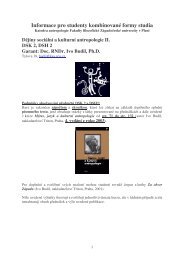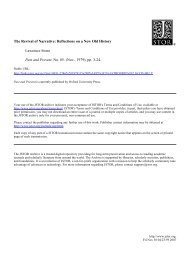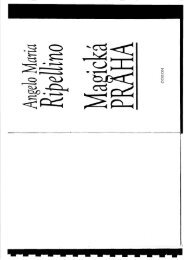BOB SCRIBNER Historical Anthropology of Early Modern Europe
BOB SCRIBNER Historical Anthropology of Early Modern Europe
BOB SCRIBNER Historical Anthropology of Early Modern Europe
Create successful ePaper yourself
Turn your PDF publications into a flip-book with our unique Google optimized e-Paper software.
18 Bob Scribner<strong>of</strong> power and social consensus. Here the symbolic anthropology <strong>of</strong> CliffordGeertz was quite influential, although the marxian anthropology <strong>of</strong>Maurice Bloch represented an alternative line <strong>of</strong> thought that found littlewider response among historians 15 .The original interest <strong>of</strong> historians in ritual undoubtedly emerged becauseit was seen as a way <strong>of</strong> understanding potent currents <strong>of</strong> dissentwithin pre-modern societies (exemplified in religious riot, iconoclasm,carnivalesque events, rituals <strong>of</strong> popular justice, notions <strong>of</strong> the 'reversibleworld'), but more recently emphasis has shifted to the ways in whichrituals constitute and conserve societies by creating consensus amongtheir members, whether as rites <strong>of</strong> power or as rites <strong>of</strong> incorporation 16 .The main thematic lines <strong>of</strong> argument have concerned the way in whichrituals create symbolic universes and a means <strong>of</strong> identification with thosewho stage 'rites <strong>of</strong> power'. However, historical studies in this area haveleft rather too many questions unanswered and there has been a tendencyto accept too uncritically the theoretical stance <strong>of</strong> the anthropologicalworks cited, as though these were in themselves free from presuppositions.Thus, it, has been too readily assumed that rituals always workand that they are always understood by their audience in the way intendedby those who stage them. The possibility has been overlooked thatsome rites <strong>of</strong> power are no more than expressive forms <strong>of</strong> self-displaywhose effect is confined to their performance and which work primarilyon those staging them for their own purposes. Meanwhile, the anthropo-ular Ritual (Assen/Amsterdam, 1977); A. van Gennep, The Rites <strong>of</strong> Passage (London,1960; orig. ed. 1908).15 M. Bloch, Ritual, History and Power (London, 1989), esp. chs. 2, 9; P. Bourdieu,'Rites as Acts <strong>of</strong> Institution', in: J. G. Peristiany, J. Pitt-Rivers, eds., Honor andGrace in <strong>Anthropology</strong> (1992), 79 - 89; D. Cannadine, S. Price, eds., Rituals <strong>of</strong> Royalty. Power and Ceremonial in Traditional Societies (Cambridge, 1987); C. Geertz,'Centers, Kings and Charisma: Reflections on the Symbolics <strong>of</strong> Power', in: Rites <strong>of</strong>Power. Symbolism, Ritual and Politics since the Middle Ages, ed. S. Wilentz (Philadelphia, 1985), 13 - 38; C. Geertz, Negara. The Theatre State in Nineteenth CenturyBali (Princeton, 1980); S. Wilentz, ed., Rites <strong>of</strong> Power. Symbolism, Ritual and Politics since the Middle Ages (Philadelphia, 1985).16 See for example the works by Mervyn James, 'Ritual, Drama and Social Body in thelate-medieval English Town', Past & Present 98 (1983), 3 - 29; Thomas A. Brady,'Rites <strong>of</strong> Autonomy, Rites <strong>of</strong> Dependance: South German Civic Culture in the Age<strong>of</strong> Renaissance and Reformation', in: Religion and Culture in the Renaissance andReformation, ed. S. Ozment (1989), Sixteenth Century Essays and Studies, vol. 11,pp. 9 - 23.







